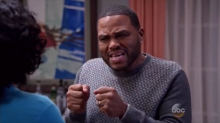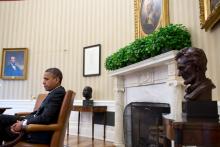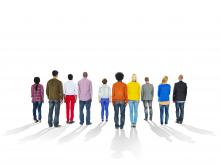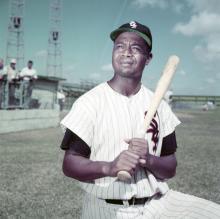post-racial

“Let’s say they listen to the cops and get in the car,” Anthony Anderson’s character Dre said Feb. 24 on black-ish, referring to his kids, if they were to be arrested.
“Look what happened to Freddie Gray.”

THE GRAINY, STUTTERING surveillance footage shows police milling about, offering no medical assistance to the 12-year-old boy, Tamir Rice, one of them has just shot. They only spring into action when the boy’s older sister runs into the frame toward her brother. An officer tackles the girl, knocking her back in the snow, then cuffs her and puts her in the patrol car, only a few feet from her dead or dying brother.
This extended footage, released in January, and bystander cell phone footage from a few minutes later with audio of the sister wailing over and over “they killed my brother,” brought into my head the Good Friday spiritual “Were You There?” It was another moment, in months of unrest over police killings of black adults and children, when the question pressed in on me as a white person. “Were you there? Were you there when they choked my father dead? Were you there when they shot my son? Were you there when they killed my brother? Were you there?”
While books and other cultural works are no substitute or shortcut to the spiritual work of true repentance and detoxifying from cheap grace, they can be means of deepening understanding and finding the resolve to take action. Along with the film Selma, following are some of the artistic resources I’m turning to this Lent.

The shooting of Michael Brown and the failure of a grand jury to indict the shooter, Darren Wilson, are symptoms of a wider malaise.
It is part of a deep-seated illness that infects our body politic: racism.
The sad reality is that so many people believe we live in a post-racial society because we have a black president. We cannot address the issue, challenge ourselves and transform our societies without a prophetic voice. Ferguson is the space where I see that voice re-emerging into America’s consciousness.
Racism is not just about individual acts. It is about a system that allows unarmed black boys to be shot at a rate 20 times that of white boys; it allows a prosecutor to deliver a speech as a defense attorney for the accused after he fails to get an indictment. It is a system that has a black president telling people to calm down as the police, in military gear, attack them.

A study came out recently saying that millennials (a category that I apparently fit into) consider ourselves the “post-racial” generation. By and large, young adults think they are the ones who have moved past racism.
Except, that’s not true. Racism is alive and well.
Here at Sojourners I’m privileged to be a part of enlightening conversations about diversity, racism, sexism, and a whole host of other injustices. This makes it all the more frustrating when I try and continue those conversations outside the Sojourners community, and I’m met with resistance. Most of my friends are extremely uncomfortable discussing race. And not just because it’s a taboo subject; this is D.C., after all, and politics are always fair game in friendly discussion. Instead, I’ve found that my friends are so unsettled by the subject that they either try and change it, or they tell me it’s not about race, it’s about income inequality. Those arguments, which I follow up with “where do you think the income inequality came from?,” are still met with resistance, and arguments that if we could just bring people out of poverty, the racial disparities would vanish.
Except they wouldn’t.

Baseball players Larry Doby was black and Steve Gromek was white. Gromek was from the working-class culture of Hamtramck, Mich., and Doby from the Jim Crow culture of Camden, S.C.
One year earlier, on July 5, 1947, at Comiskey Park in Chicago, Doby had become the second African-American behind the great Jackie Robinson of the immortal Brooklyn Dodgers to play for a major league baseball team and the first African-American to play in the American League.
It was a revolutionary picture because it showed the world a way white supremacy and racism could be overcome.